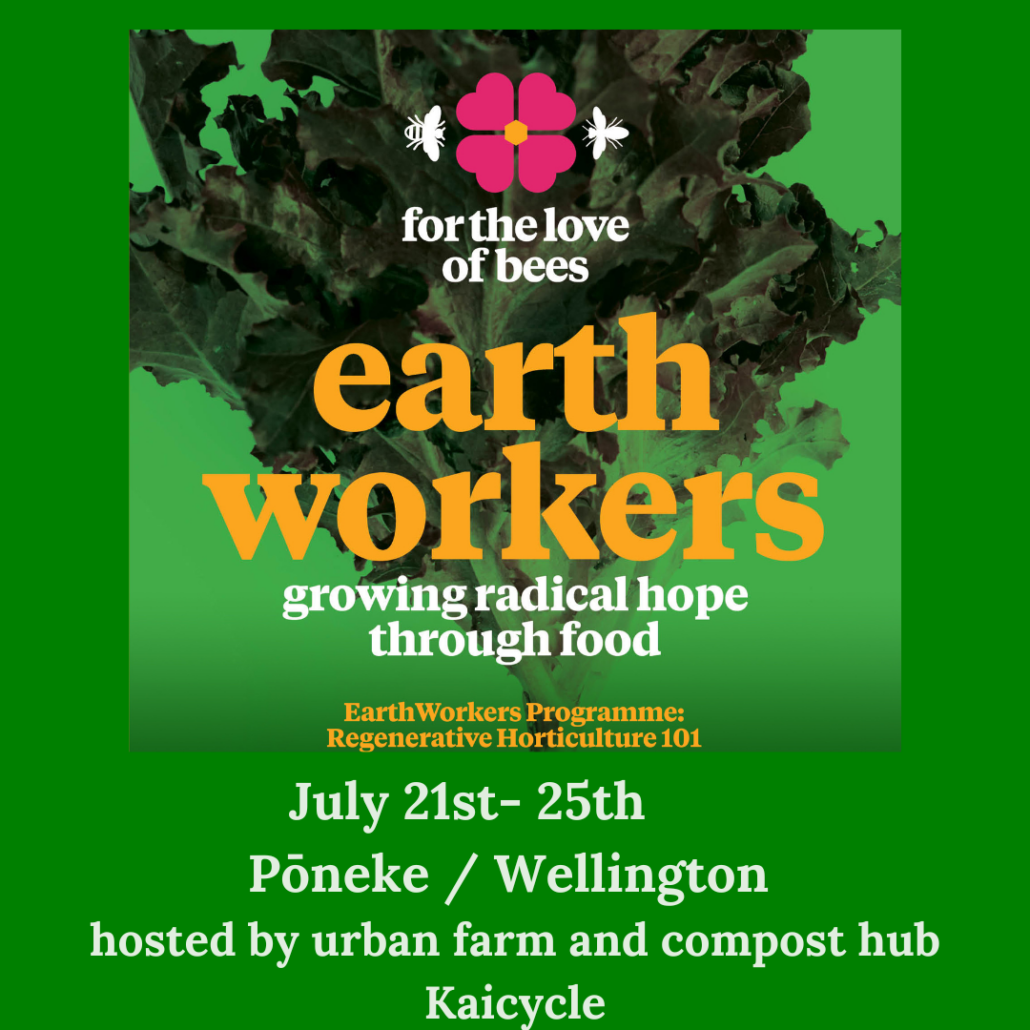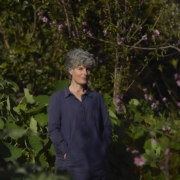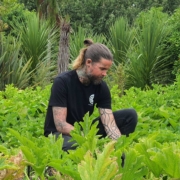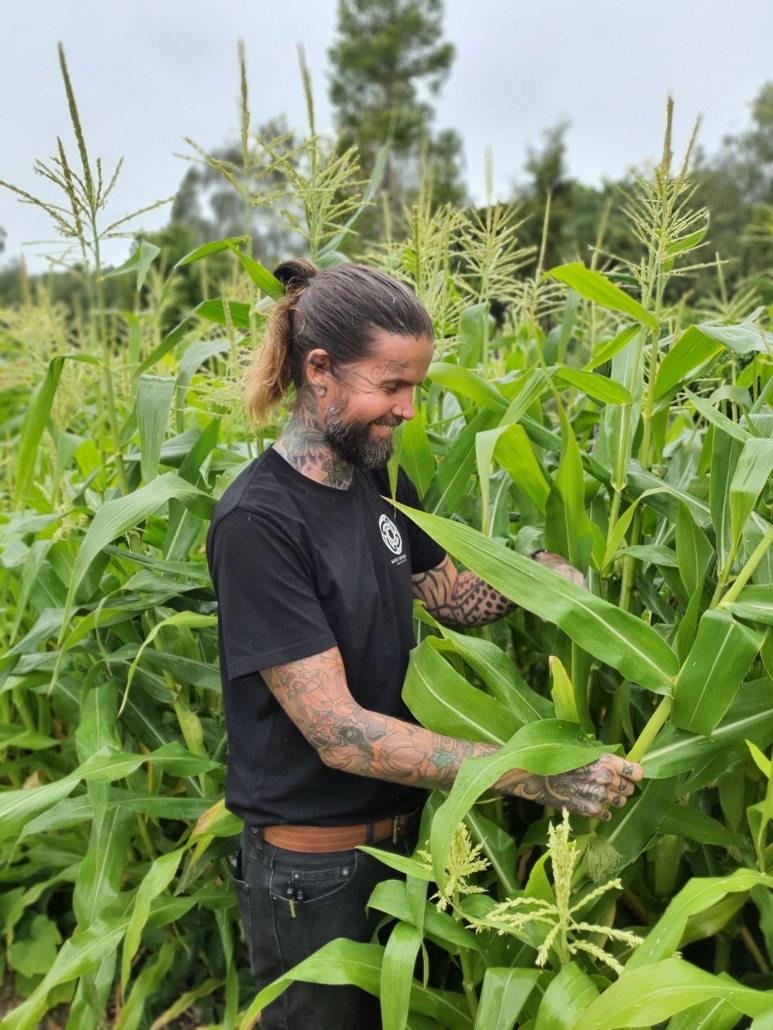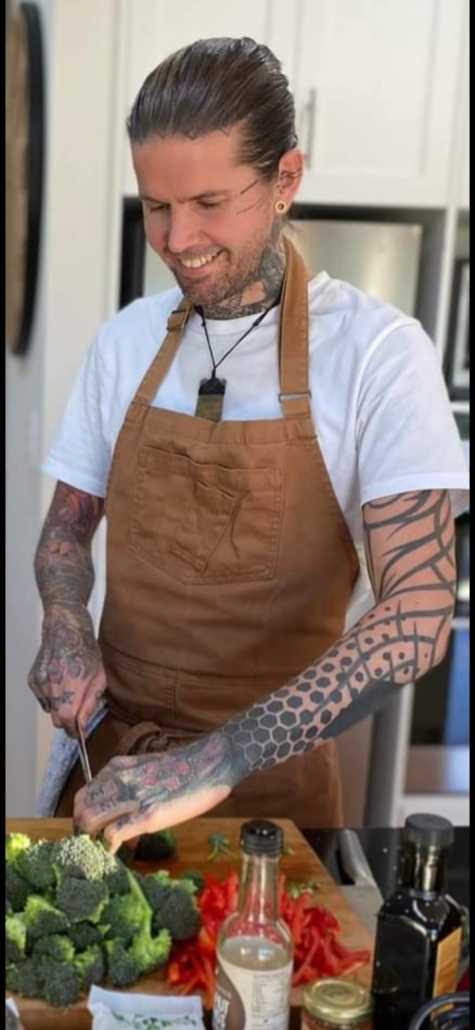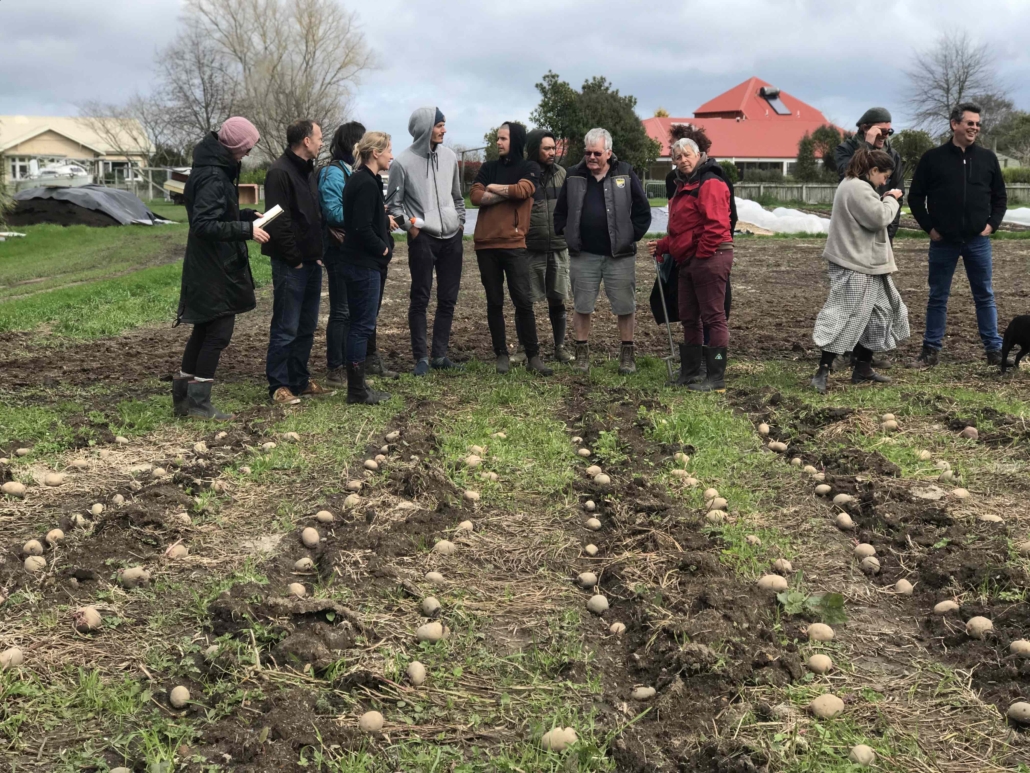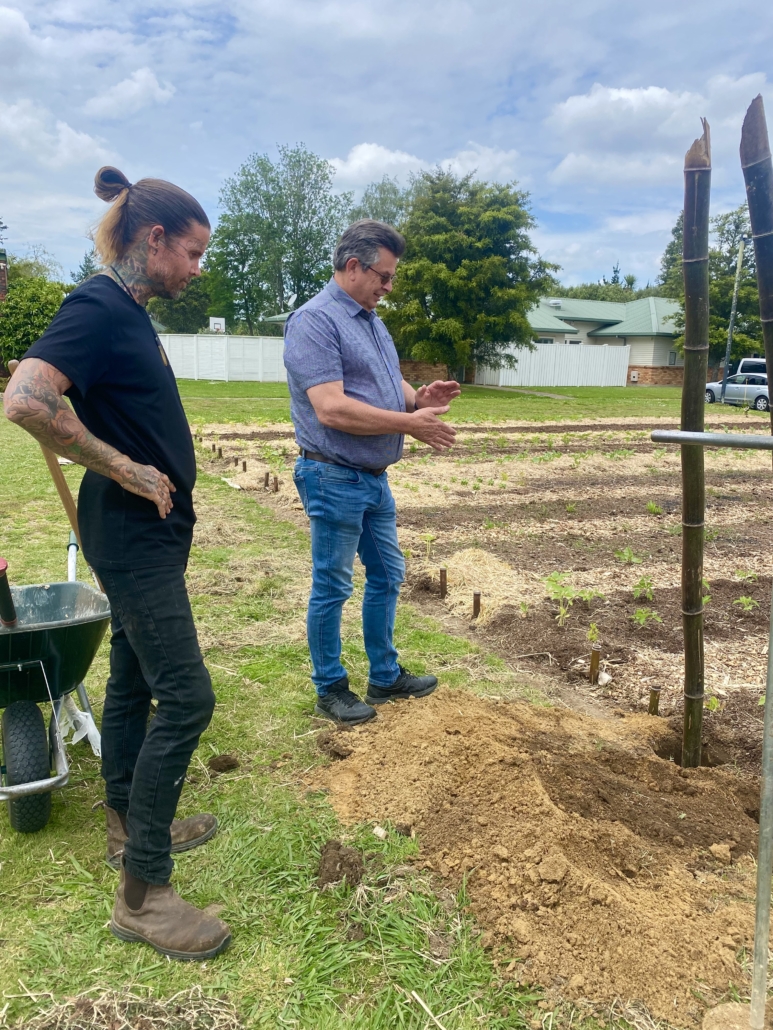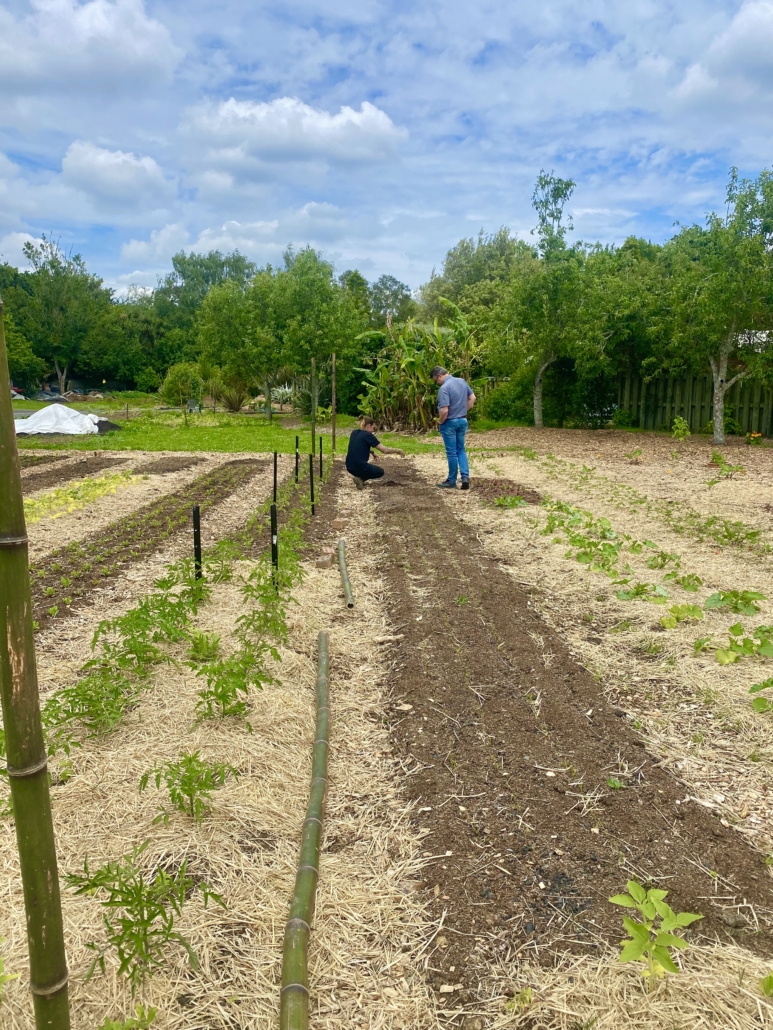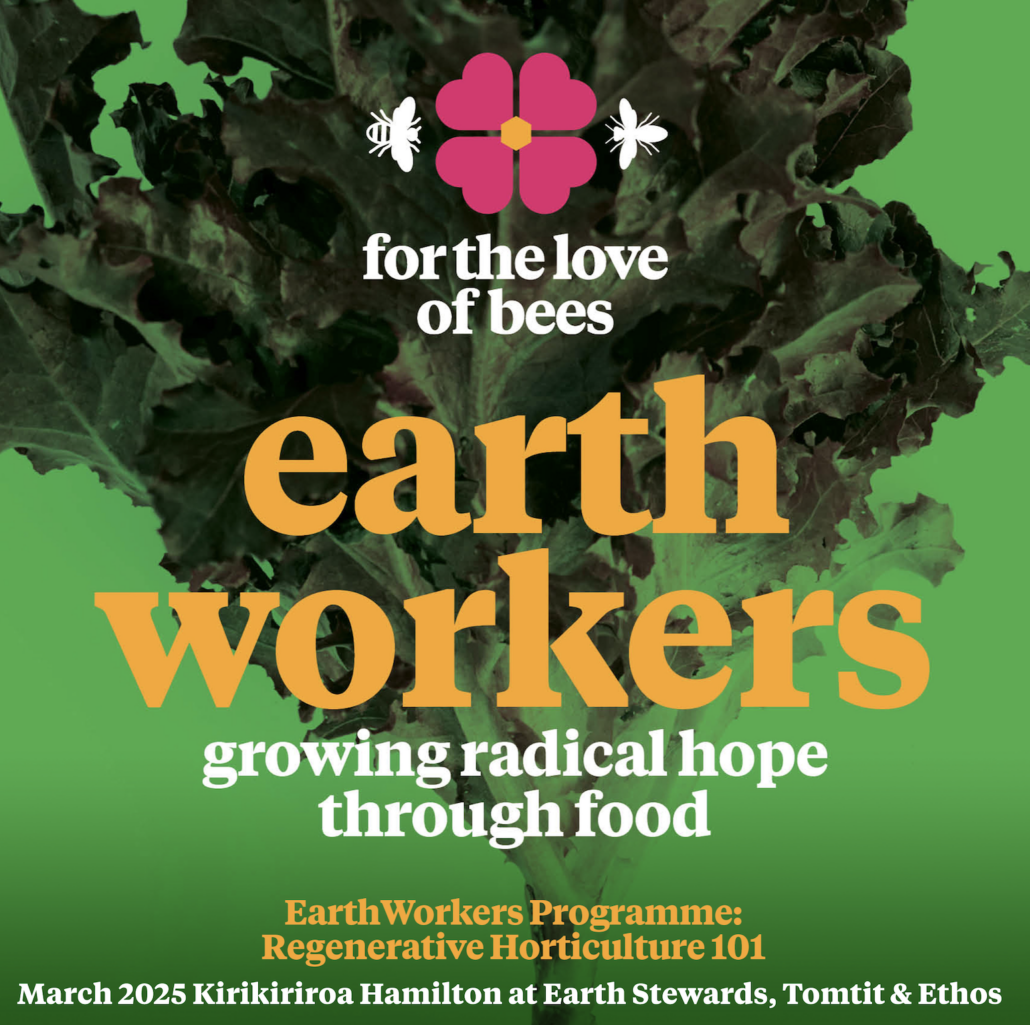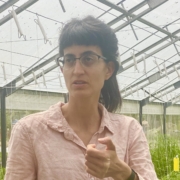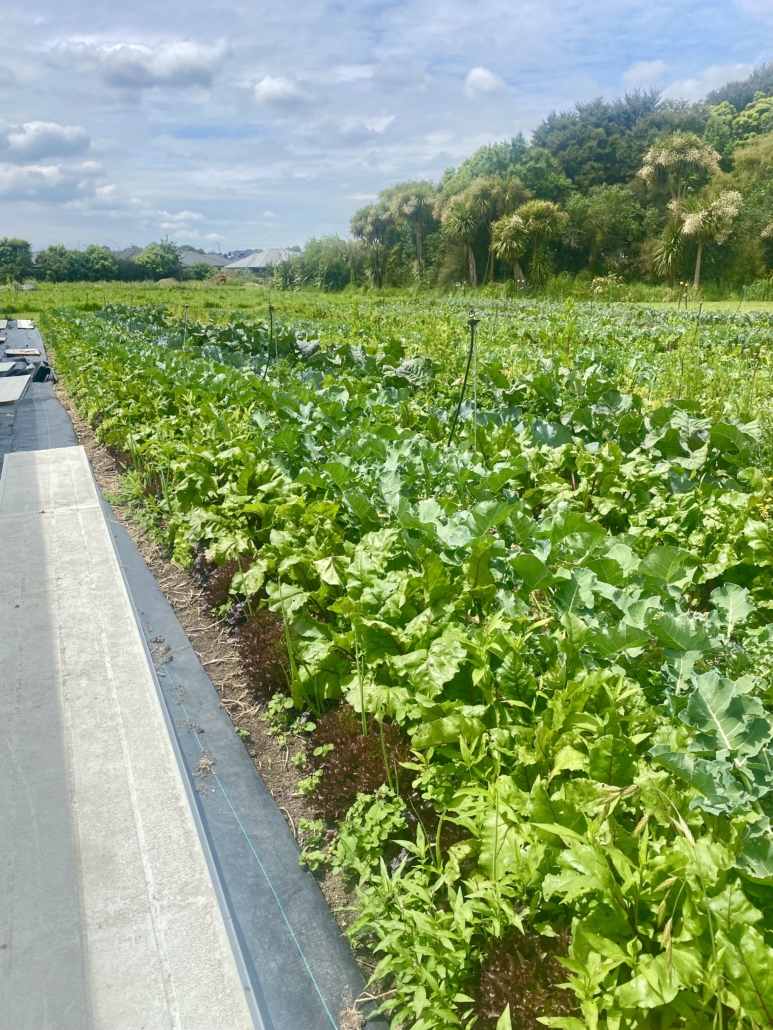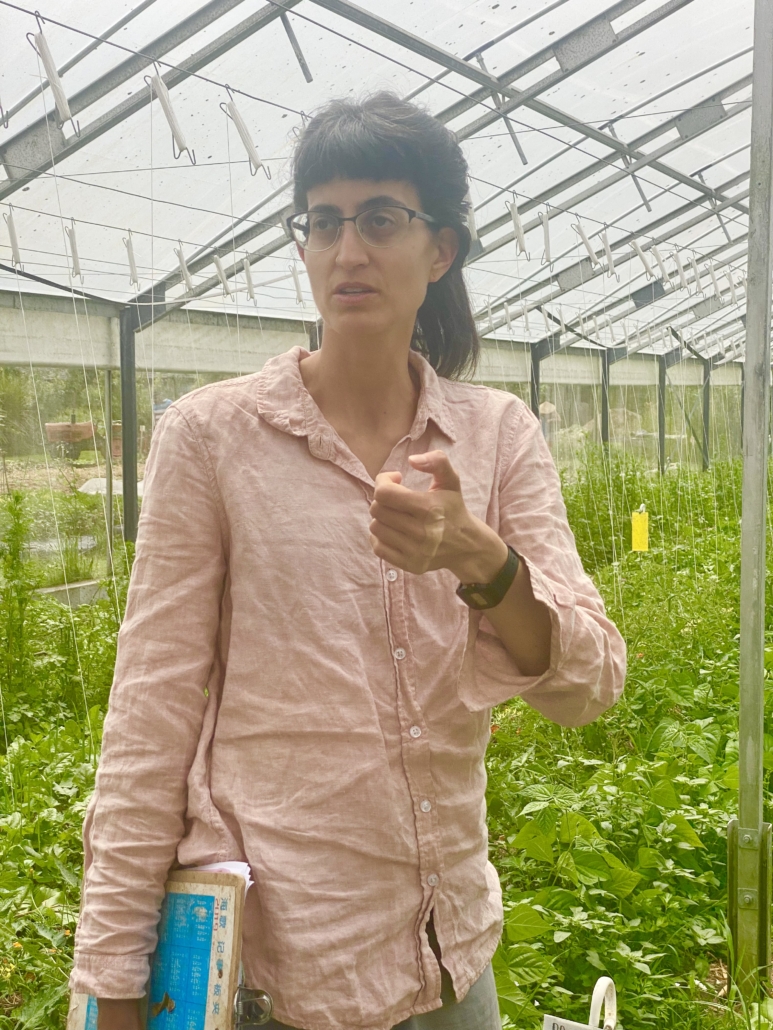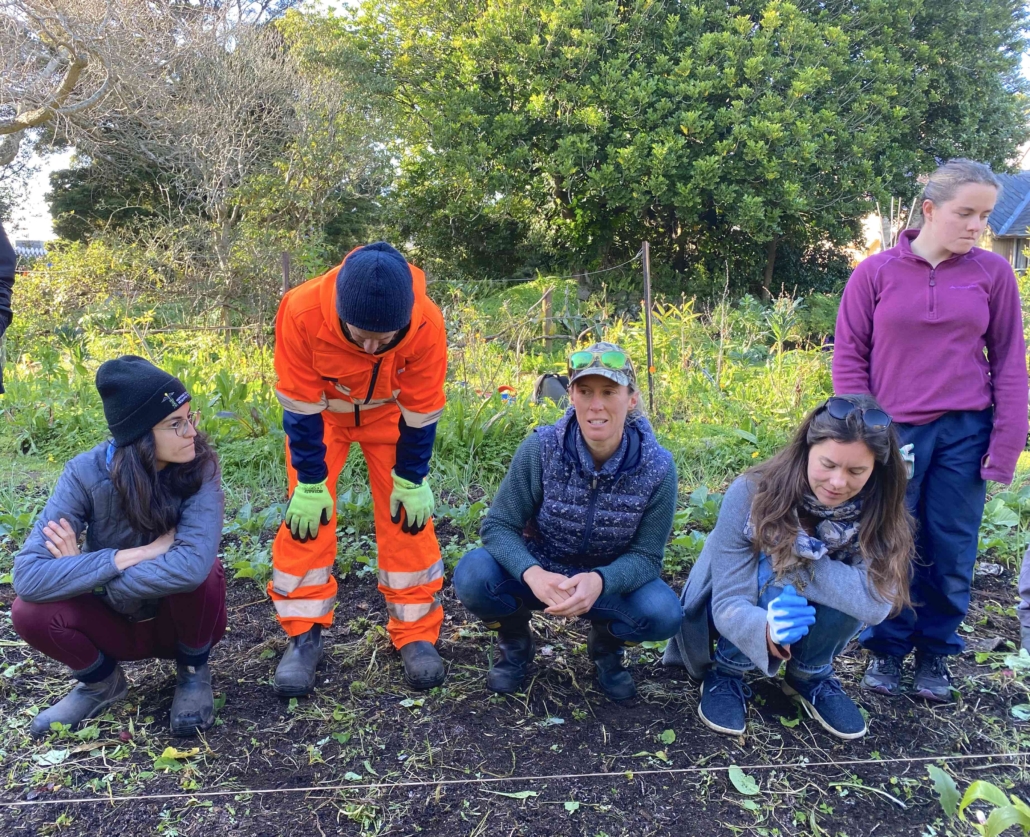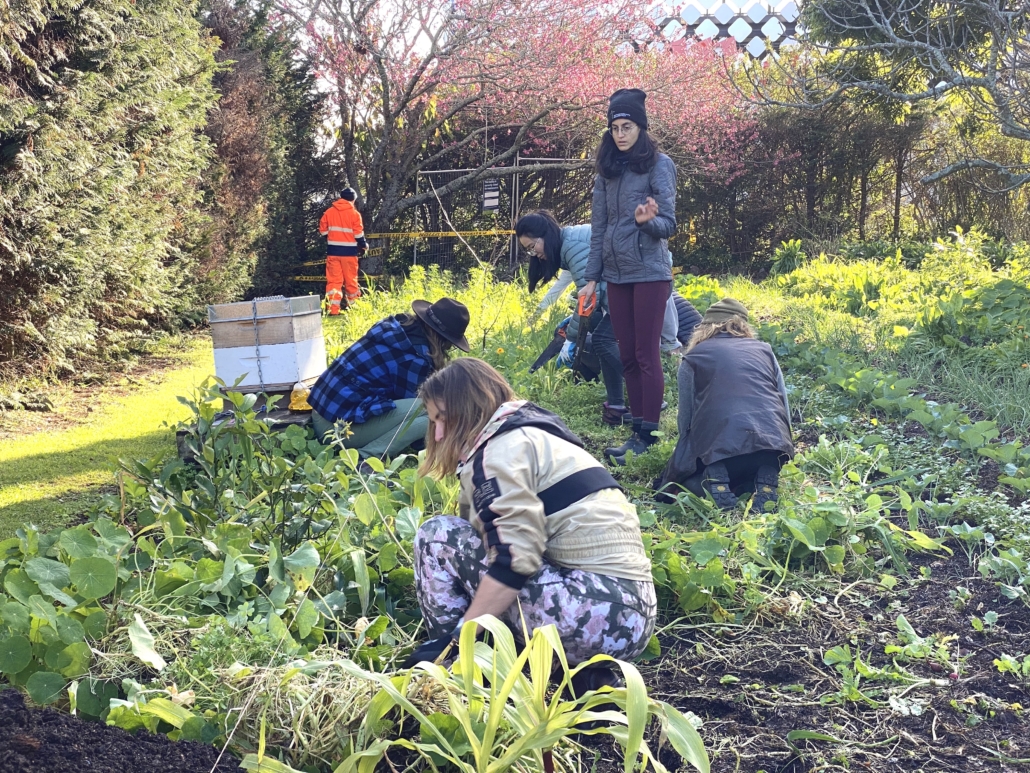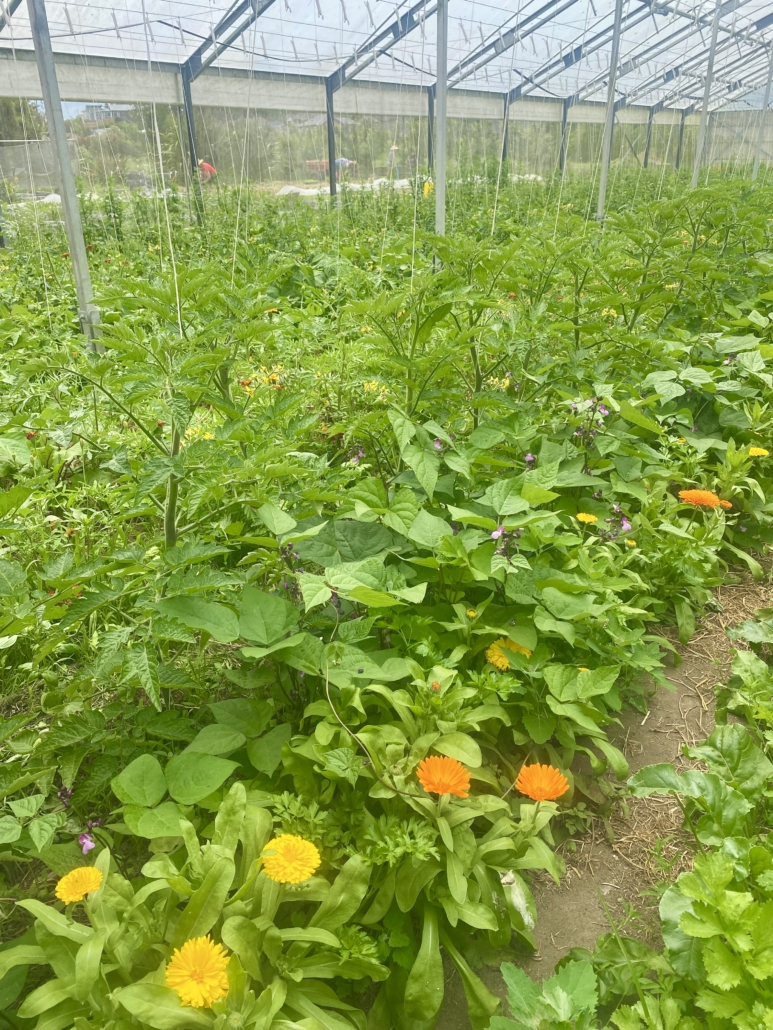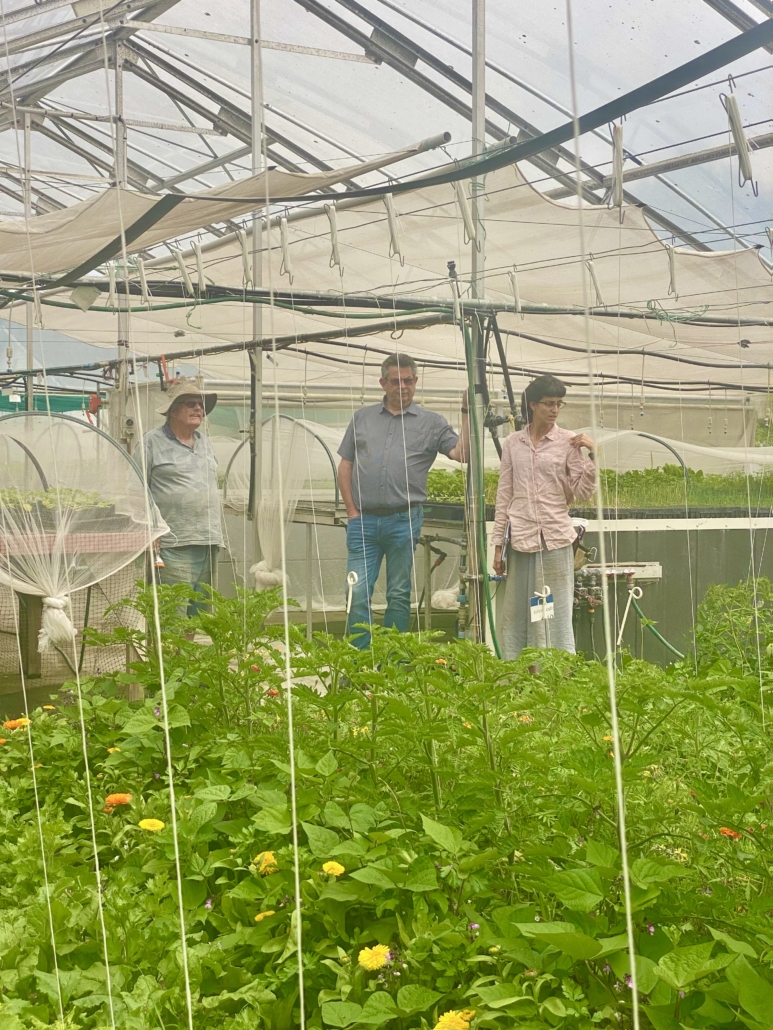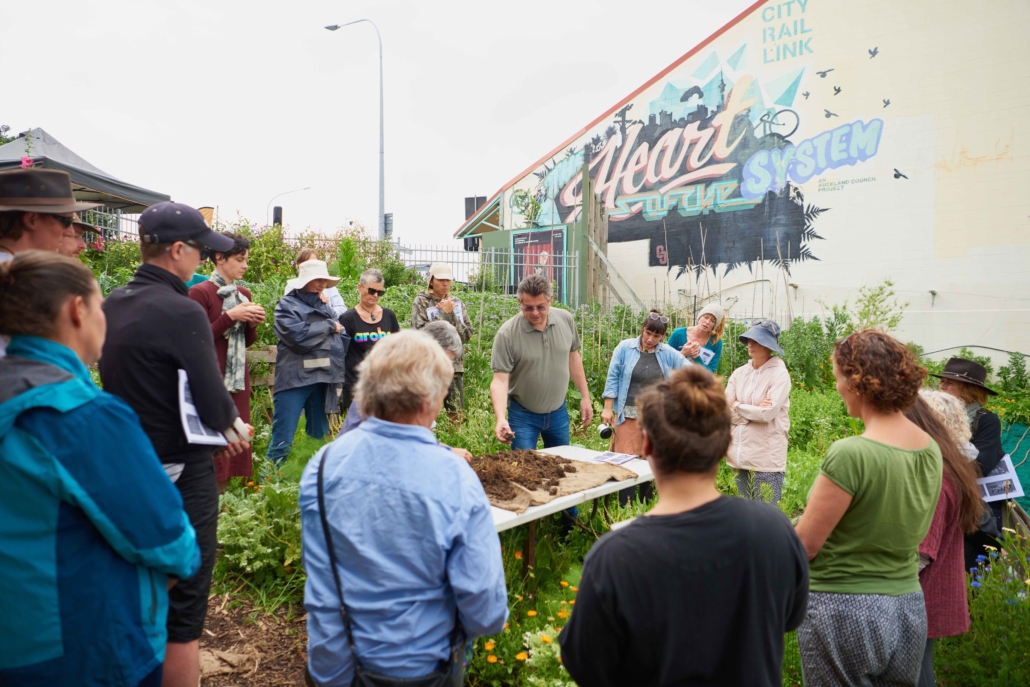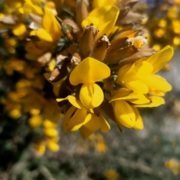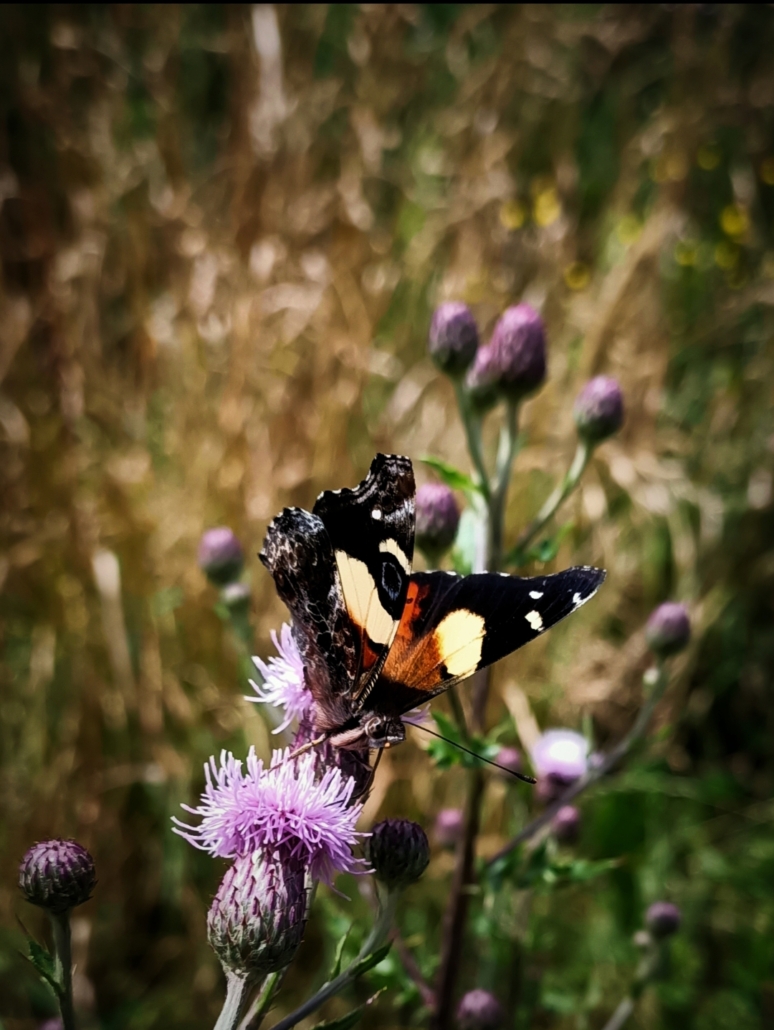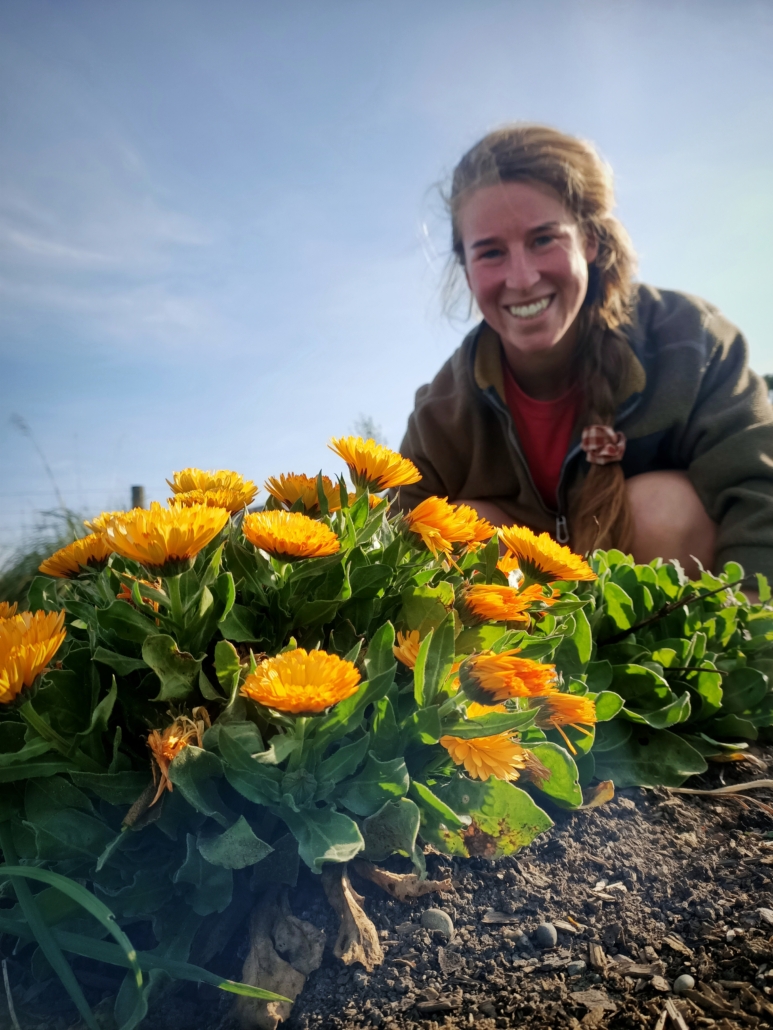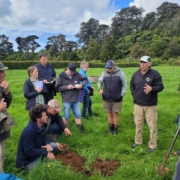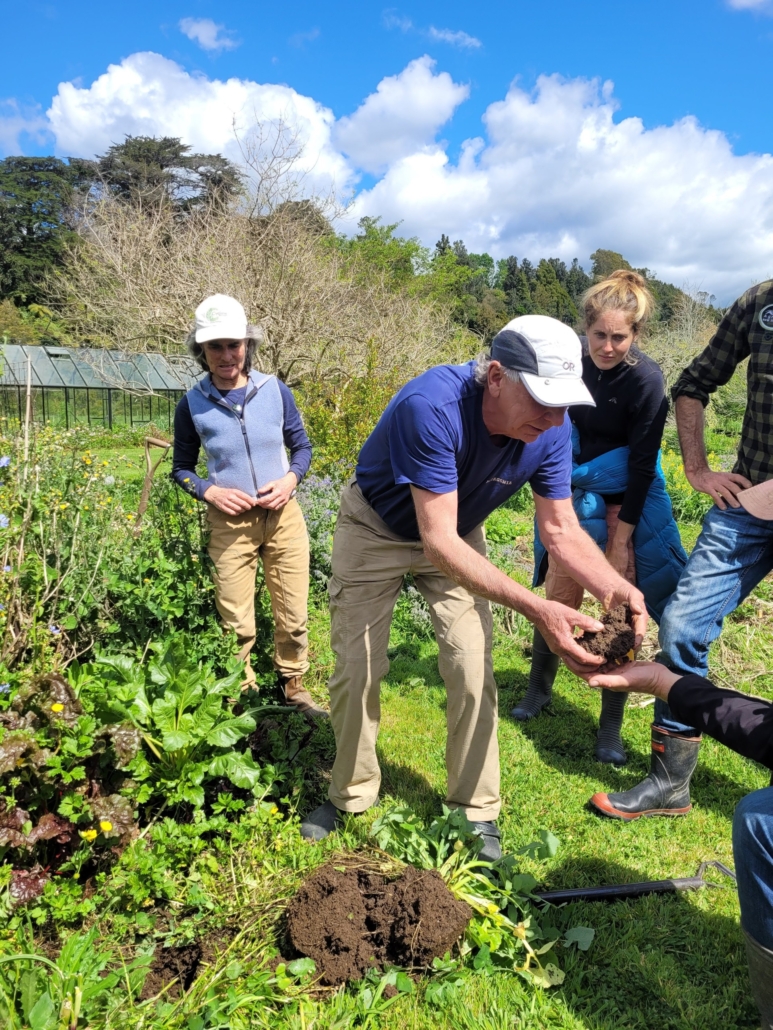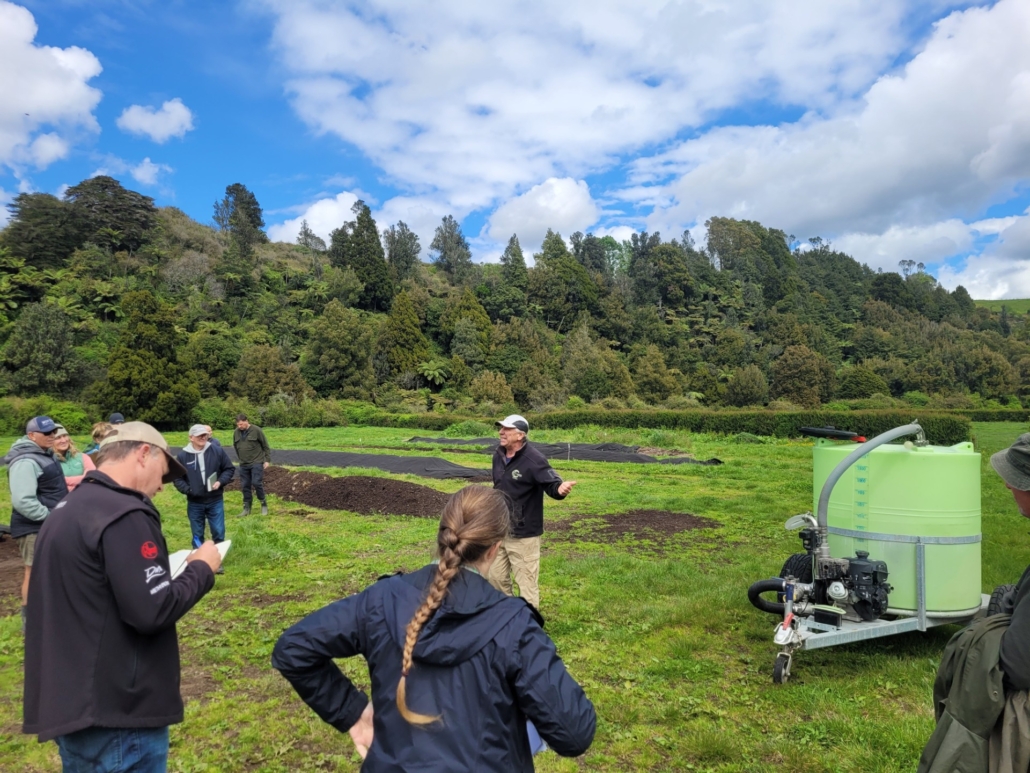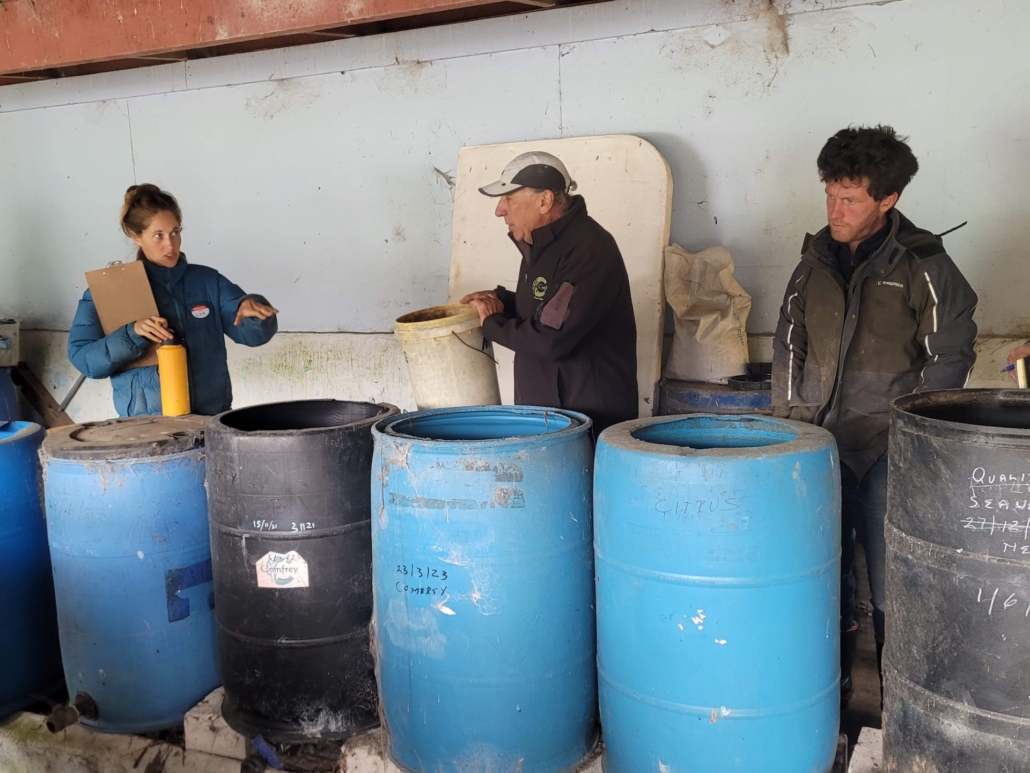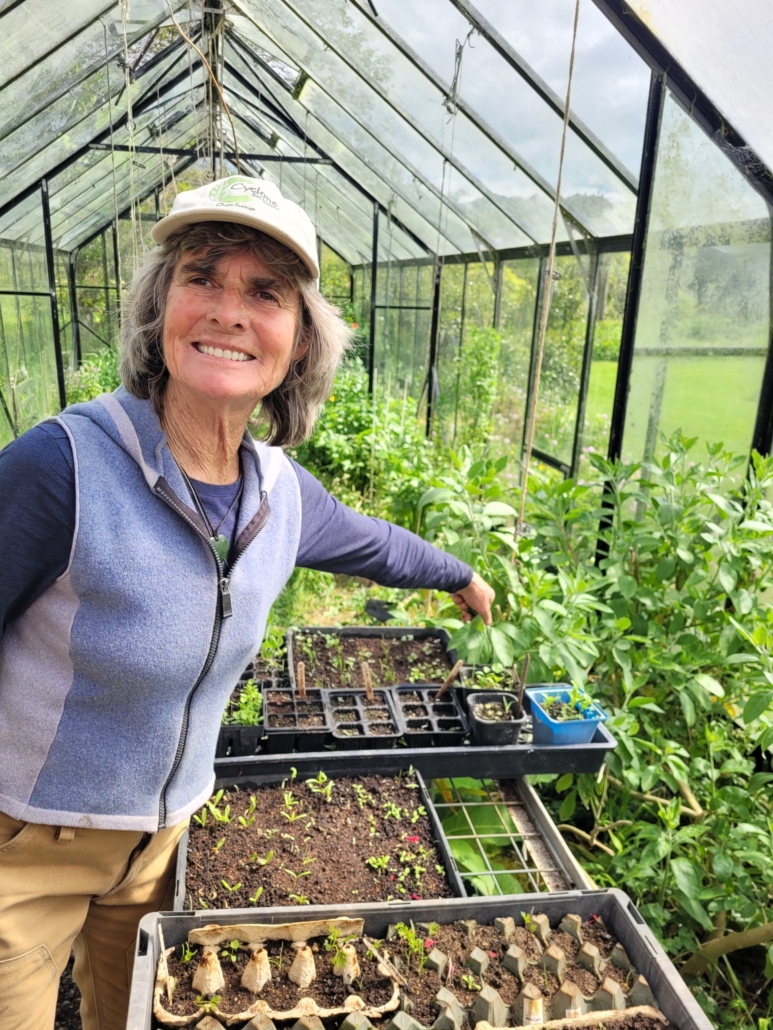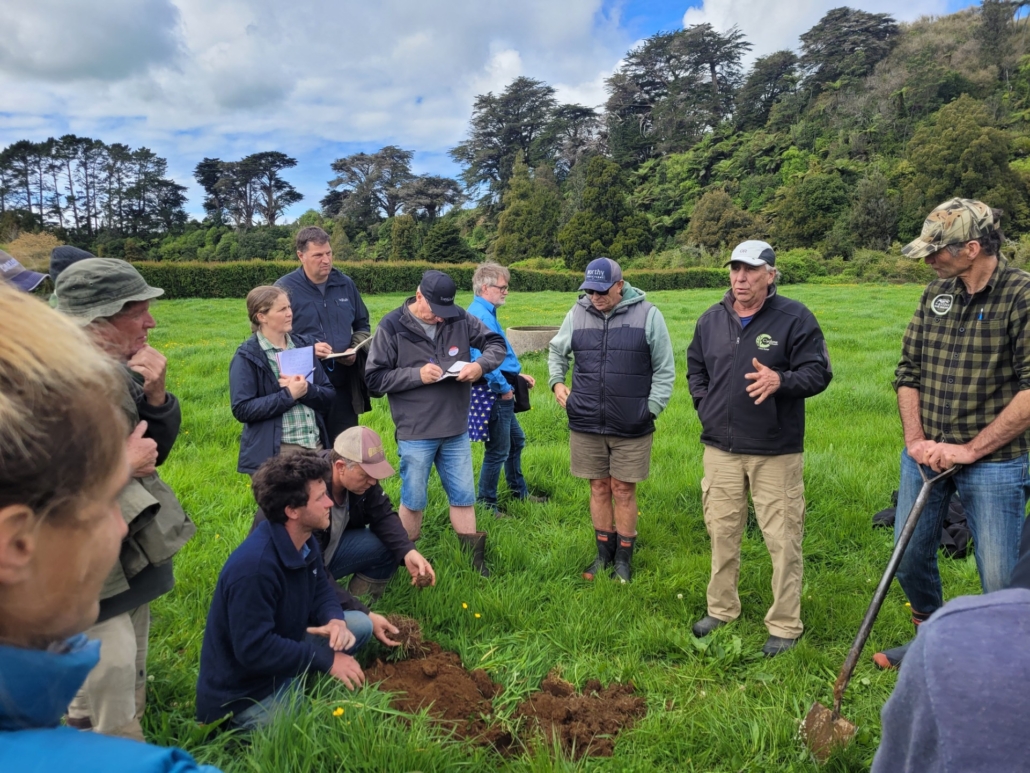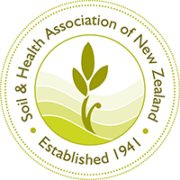Cultivating Change
Organic NZ interviews Sarah Smuts-Kennedy
Sarah Smuts-Kennedy has dedicated her life to cultivating change – not just in the soil, but in the way we grow, learn, and connect to the land. From her early days as an artist to becoming an advocate for biology-first regenerative horticulture practices, she has helped reshape how we view the potential of food production in our cities and its capacity to heal the soils we grow in.
Sarah shares her transformational journey, the challenges and triumphs of founding For the Love of Bees (FTLOB), their model farm OMG and the Earthworkers Hort 101 educational pathway.
We hope you enjoy this free article from OrganicNZ. Join us to access more, exclusive member-only content
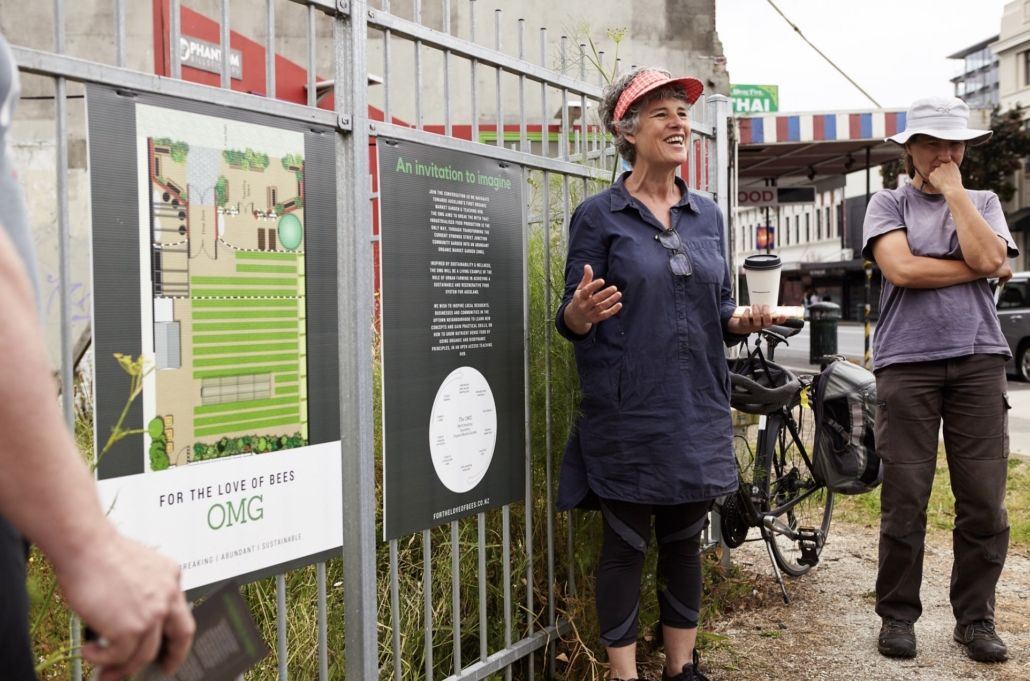
Tell us a bit about your background, Sarah. You’ve had quite a diverse career journey.
I’ve had an unconventional path, to say the least. I was an actor for over 20 years, from the ’80s through to the early 2000s. In the early 2000s I moved to Australia and became an artist and in 2005 I got to travel to India and exhibit my art in New Delhi. That experience really changed my perspective on the world. I began to use my art practice to explore the environmental issues we were facing, like deforestation and coal mining in Australia.
By 2010, I realised that my art wasn’t having the kind of impact I wanted. I was highlighting problems but not providing solutions. So, I decided to make a shift. I enrolled in a Permaculture Design Course at the same time I began an Master of Fine Arts and started working with biodynamic practices, committing myself to learning how to regenerate land I had just moved to which we named Maunga Kereru. I wanted to focus on solutions and find ways to share these practices with others.
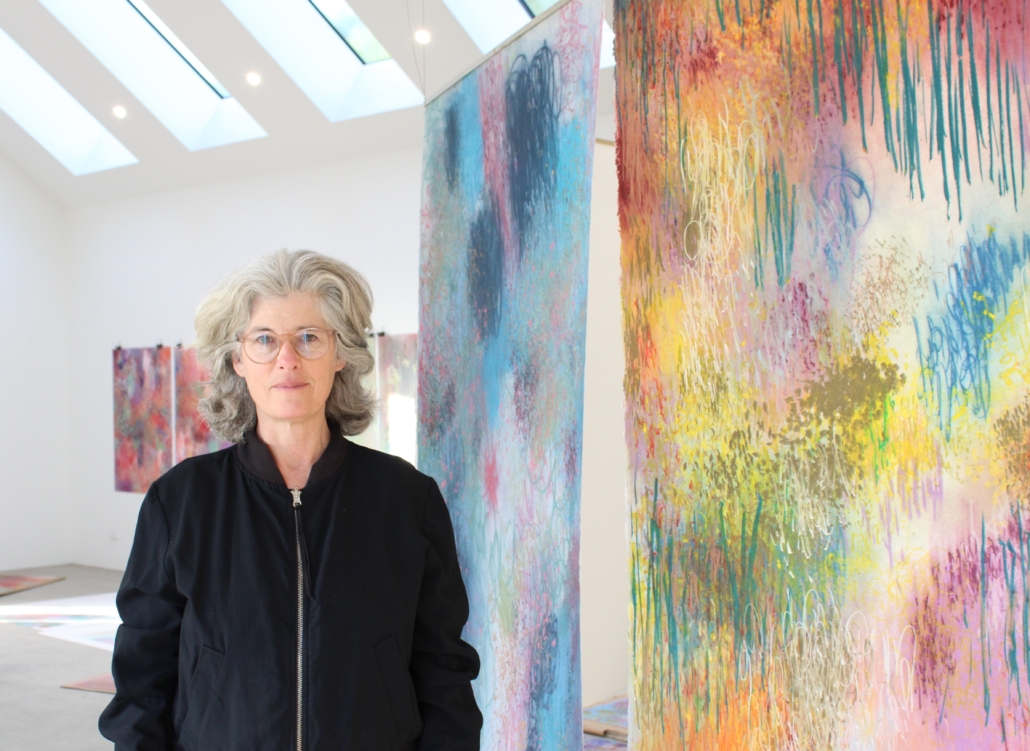
You’ve had quite an impact in the regenerative urban farming community. How did For the Love of Bees and Earthworkers come to be?
In 2014, I worked on a collaborative artwork called ‘The Park’, which aimed to bring bees into the city and encourage people to engage with their local food sources. Through this project, I connected with Daniel Schuurman, who introduced me to the idea of using fungi to improve plant health.
I realised that while art could bring attention to environmental issues, it was through practical action that real change could be made. This led to the creation of For the Love of Bees, a project focused on reimagining urban environments as safe spaces for bees. We wanted to build a community that would prioritise biology-first regeneration horticulture. Over the years, that vision grew into Earthworkers, an educational platform designed to equip people with the skills they need to regenerate the land and grow food sustainably.
To date, over 200 people have graduated from Earthworkers, many of whom are now working professionally in the sector, spreading the knowledge they’ve gained through workshops and projects of their own.
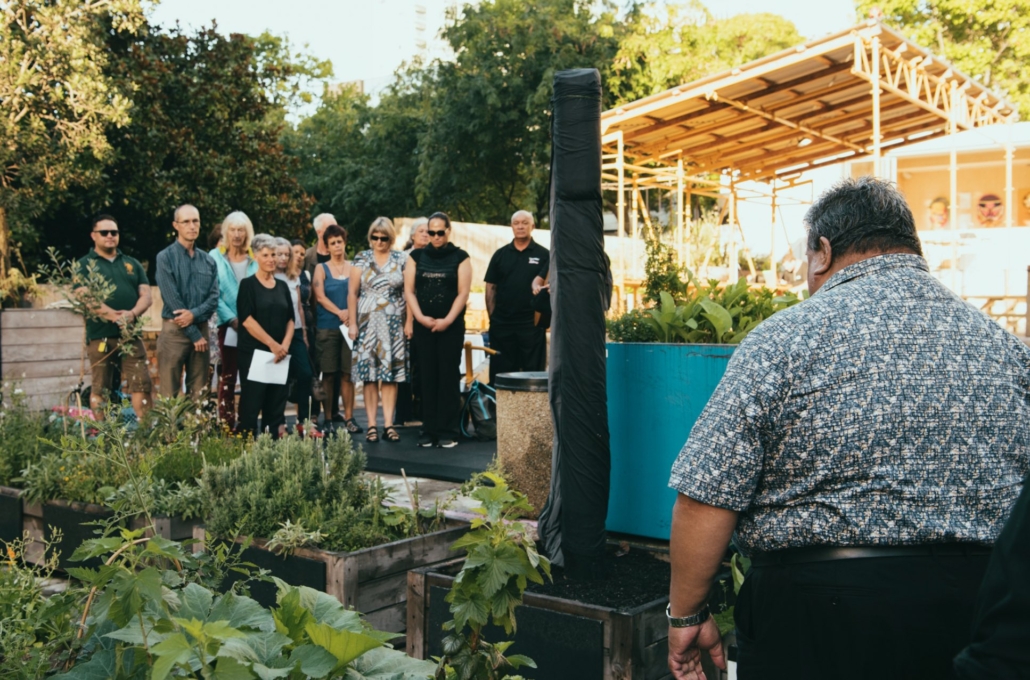
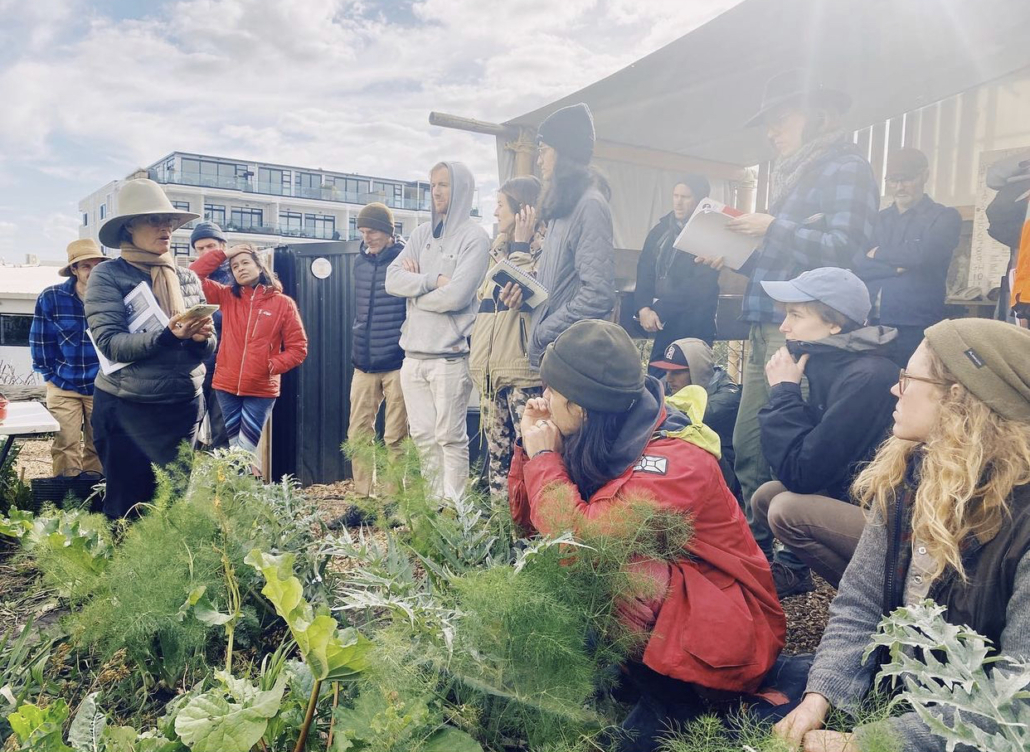
What led you to focus on education and mentorship in the agricultural sector?
I’ve always believed in learning from those who are actually doing the work. There’s so much theory out there, but hands-on experience makes the difference. After taking various courses and learning from experts like Graham Sait and Jodi Roebuck, I realised that no one was offering an educational pathway that combined learning with ongoing mentorship.
When you’re starting out in regenerative farming, so many questions arise in the field. Without proper support, it’s easy to fall back on old habits or resort to quick fixes – like pesticides or even organic fertilisers that may not always benefit the ecosystem as a whole. That’s why we integrated post-course mentoring into Earthworkers Hort 101.
The idea is that students don’t just leave with knowledge; they have a community to lean on as they continue to learn and grow. The mentorship component ensures that they implement the practices and make decisions that prioritise soil health—the foundation of any regenerative system.
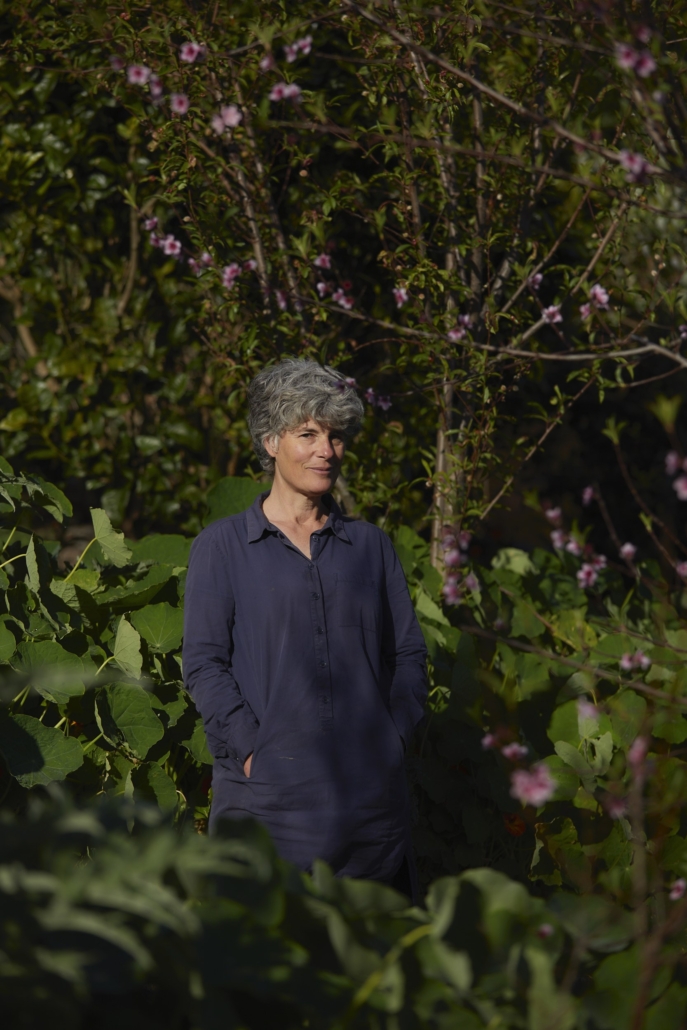
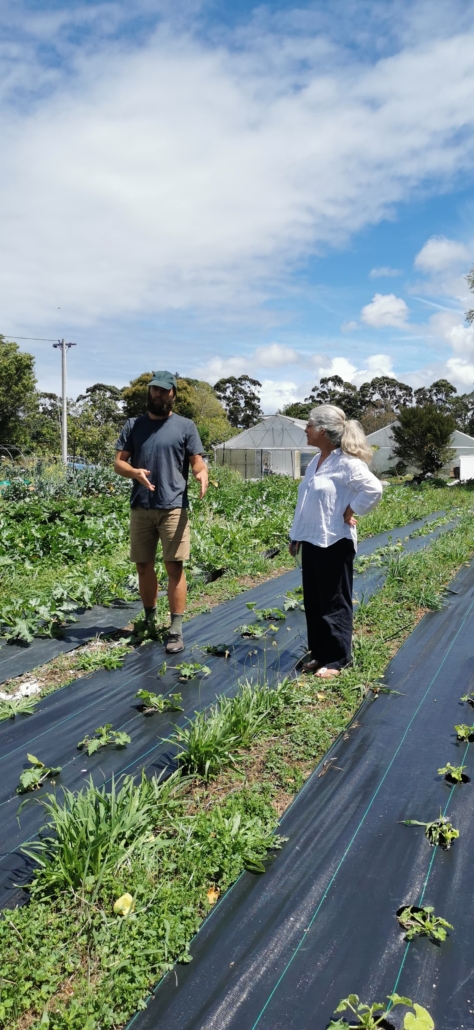
Right – Sarah teaching at an event at Solstice Organics, Whenuapai, organised by OrganicFarmNZ in February 2025
What makes Earthworkers Hort 101 different from other agricultural courses?
Our course is built around a biology-first approach to regenerative farming. We focus on soil remediation and fostering healthy ecosystems as the foundation for sustainable food production. Biology-first means prioritising the health of the biological engine of the soil, which leads to healthier plants and greater economic resilience for growers.
But it’s not just about theory – it’s about learning through doing. Our five-day intensive course is split between a deep dive into soil science in the classroom, and hands-on fieldwork. We teach everything from the microbial world and mineral cycles to soil testing and plant health monitoring. In the afternoons, we take these concepts into real-world settings – farms, community gardens, or home gardens – where students see regenerative systems in action. We teach on model farms that actively use the principles we promote, because seeing is believing. We teach people to investigate their own site’s condition and only make the amendments it needs, with a less-is-more approach.
Most importantly, after the course ends, we don’t just send students on their way – we provide ongoing mentorship. Our alumni network has become an incredible resource, with experienced graduates mentoring new students and sharing their knowledge. This sense of community is one of the most valuable aspects of the programme.
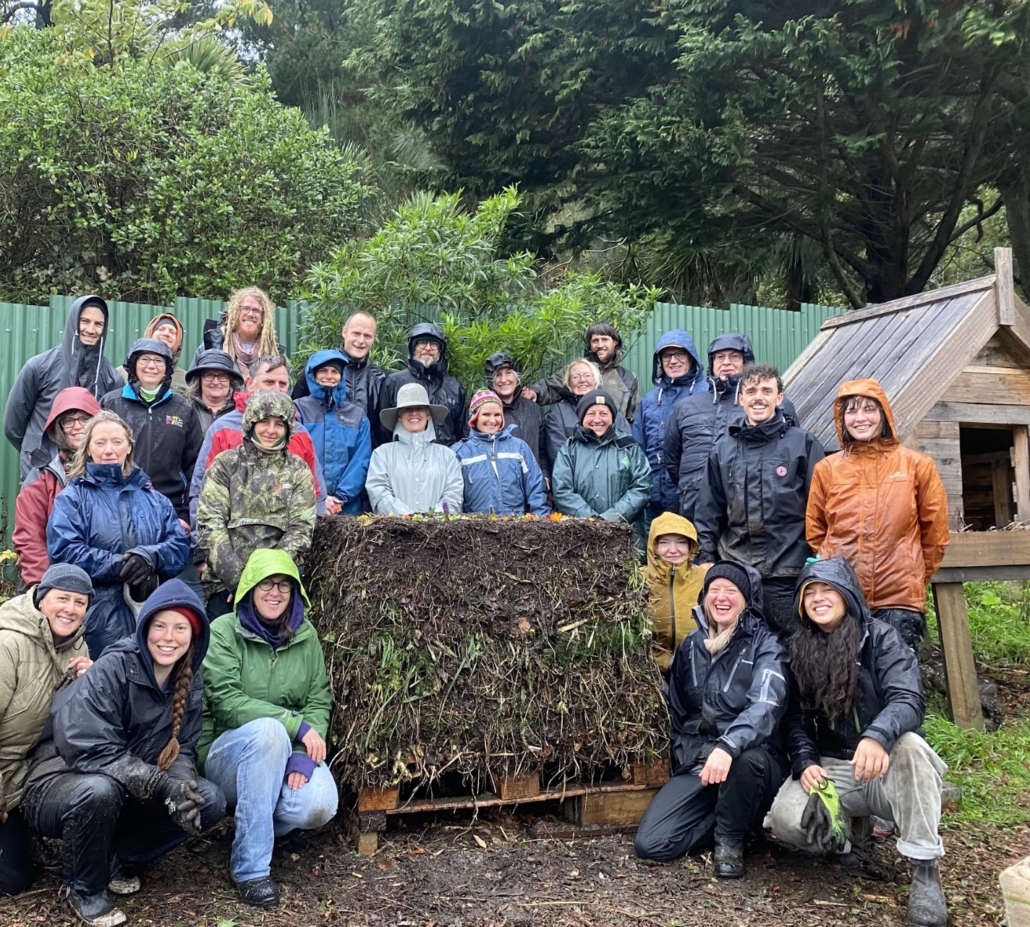
“True learning happens in the field, side by side, hands in the soil.” – Sarah Smuts-Kennedy
Why do you believe that food biology-first regenerative production is key to addressing environmental challenges?
Biology-first regenerative agriculture is one of the most powerful tools we have to combat biodiversity loss and heal farm ecosystems. It restores soil health, which leads to better food production and resilience against climate extremes.
We see the results firsthand – year after year, crops thrive, yields improve, and produce lasts longer due to higher nutrient density. This means healthier food for consumers and fewer pesticide residues, which is a growing concern for many. Farmers want to grow better, but they face barriers: time, money, and the risk of change. That’s why education and support are critical. We’re now seeing larger-scale growers becoming interested in regenerative techniques, and we believe it’s important to offer a locally supported pathway that harnesses the knowledge of their own communities.
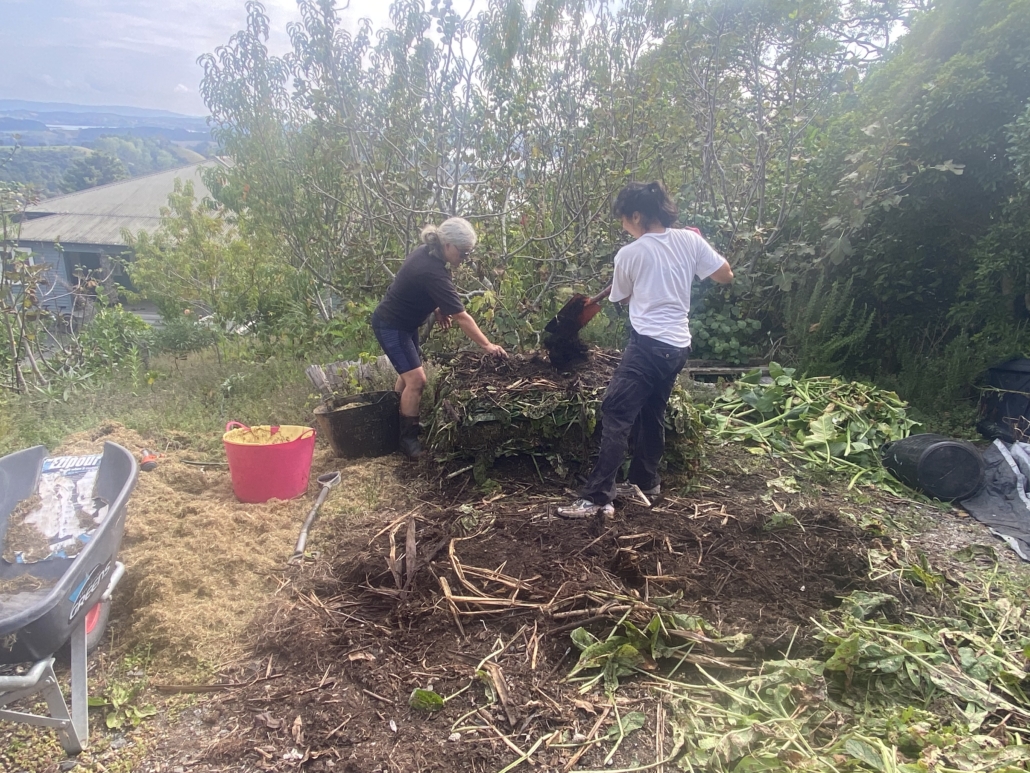
What’s next for you and For the Love of Bees?
Separating the farm (OMG) from the Earthworkers educational pathway was a tough decision, but it’s allowed us to focus fully on expanding Earthworkers. We want to develop resources to help people learn how to regenerate their land, no matter where they are, and support our alumni who are expressing a desire to train to be regenerative agronomists like Daniel.
I get excited seeing how our alumni continue to innovate and inspire others. We’ve built a strong community, and by supporting each other, we can keep growing this movement. Ultimately, my goal is to keep learning, keep teaching, and keep building a world where people are more connected to their land and food. If we can do that, we’ll be well on our way to healing both our landscapes and our communities.
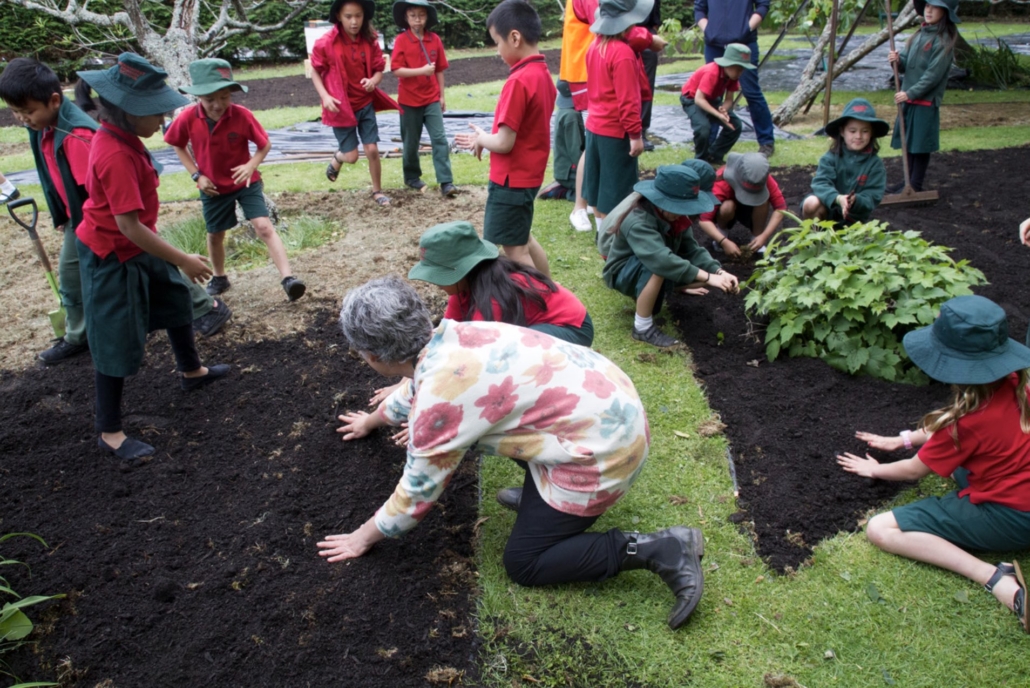
Any final thoughts on teaching and learning?
It has always been important to me that teachers practice what they teach. While I am not a commercial grower, I have spent the last 15 years deeply immersed in regenerative growing. Maunga Kereru, my 10-acre property just 45 minutes north of Auckland, has served as both sanctuary and laboratory—a place where mistakes have become lessons, and experiments have shaped my evolving understanding of ecosystems.
One of my greatest teachers has been the land itself—specifically, a 400-square-metre food forest that I regenerated from an engineered, compacted clay driveway. Over 15 years, this hard clay has transformed into the heart of food production at Maunga Kereru, providing evidence that even the most degraded soils can be revived through thoughtful interventions and design.
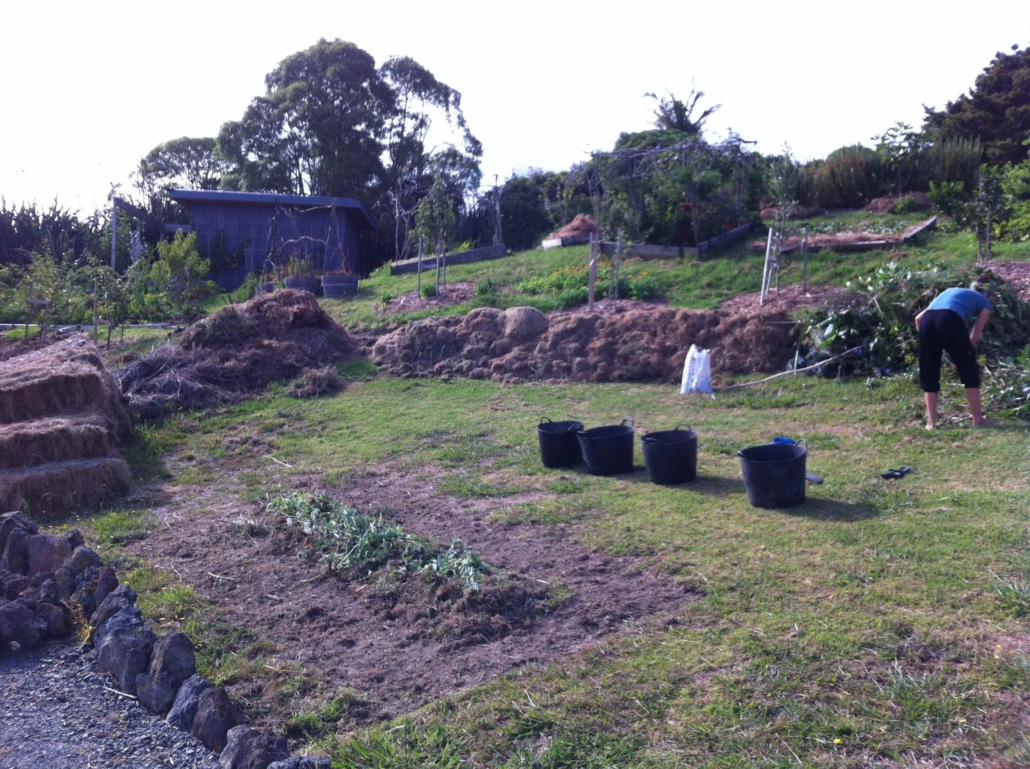
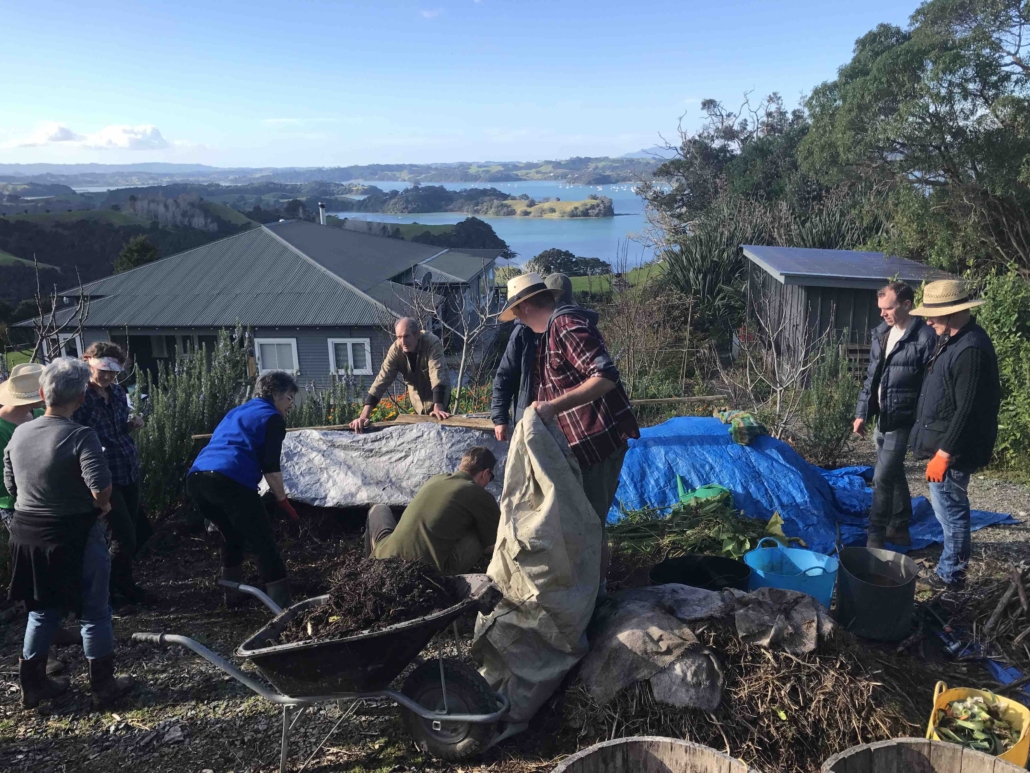
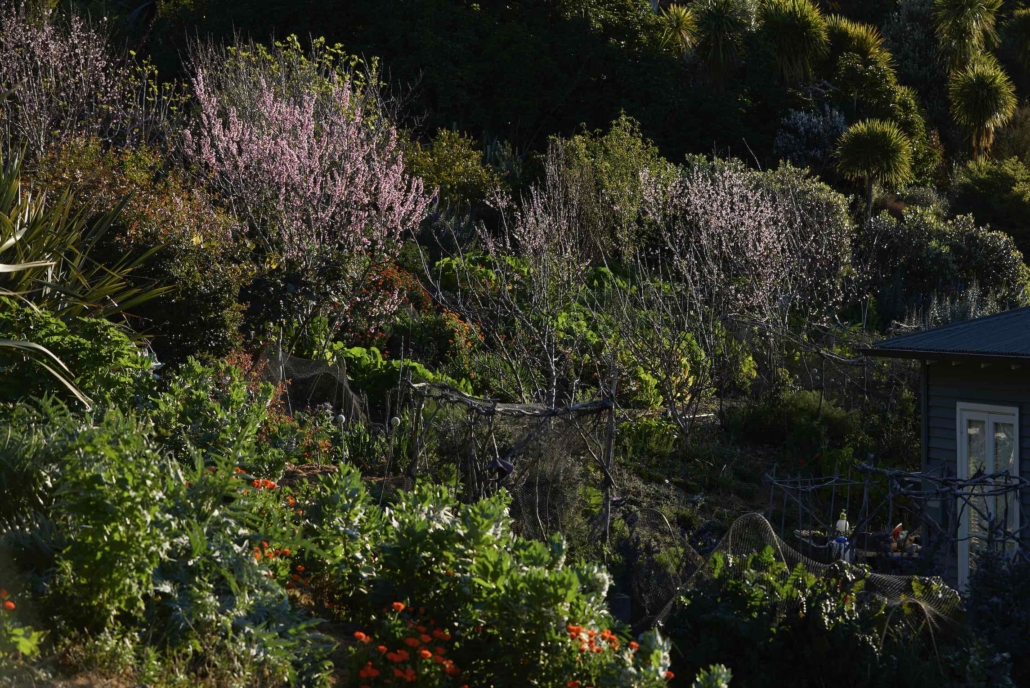
ABOVE: Photos from Sarah’s land, Maunga Kereru, Mahurangi West. Left to right: establishing compost, working bee, spring blossom amidst lush growth
I began learning how to teach here—first with my WWOOFers, then through workshops with the biodynamic community, and later with the FTLOB and OMG communities. For the past eight years, I concentrated my teaching at the FTLOB OMG farm, but my systems were always tested and refined here at home. More recently, I’ve returned to teaching at Maunga Kereru, where students can see permaculture, biodynamic, syntropic, raised beds, and traditional horticulture integrated side by side.
My knowledge is valuable, but I wouldn’t feel confident teaching Earthworkers Hort 101 without Daniel’s 40-plus years of experience as a grower and agronomist leading us. I am still a student, and each time I participate in an Earthworkers course, I integrate more complex ideas into my knowledge base. As Daniel always says, we are all learning together.
We invite the growers who host Earthworkers Hort 101 on their farms to run modules, and we encourage students to bring their own experiences into the conversation.
After all, true learning happens in the field, side by side, hands in the soil.
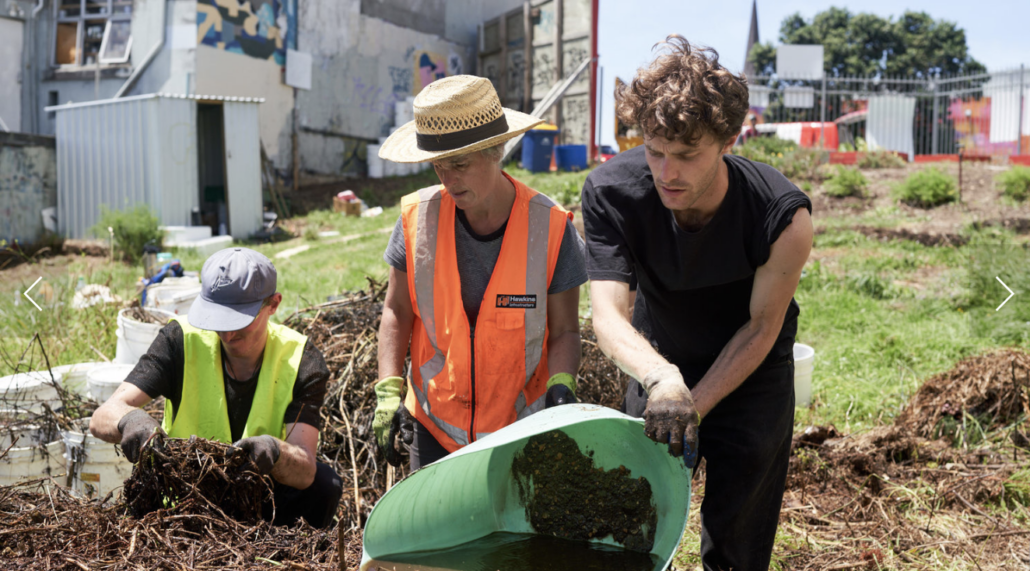
Earthworkers Hort 101
In 2025 we at the FTLOB organisation are dedicating our focus on creating an educational pathway that will allow growers to journey with us from beginners to agronomists.
The Earthworkers Hort 101 March course in Kirikiriroa/Hamilton was a huge success.
With two more courses this year, growers will be able to advance their training and benefit from the ongoing post-course mentoring programme.
COMING UP: Earthworkers Hort 101, 21–25 July 2025, Pōneke/Wellington
We are thrilled to be returning to this urban farm and community compost hub that hosted us four years ago, and being able to contribute to the region’s growers biology-first regenerative methods.
Find out more and ENROL HERE by 7 July 2025, 9pm
